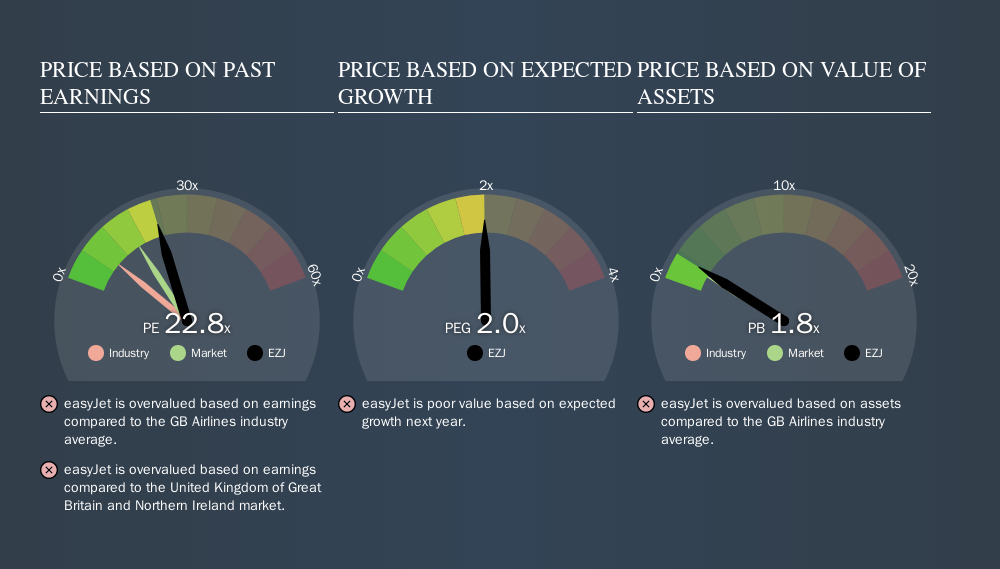- United Kingdom
- /
- Airlines
- /
- LSE:EZJ
Despite Its High P/E Ratio, Is easyJet plc (LON:EZJ) Still Undervalued?

The goal of this article is to teach you how to use price to earnings ratios (P/E ratios). We'll show how you can use easyJet plc's (LON:EZJ) P/E ratio to inform your assessment of the investment opportunity. Looking at earnings over the last twelve months, easyJet has a P/E ratio of 22.79. That is equivalent to an earnings yield of about 4.4%.
View our latest analysis for easyJet
How Do I Calculate A Price To Earnings Ratio?
The formula for price to earnings is:
Price to Earnings Ratio = Share Price ÷ Earnings per Share (EPS)
Or for easyJet:
P/E of 22.79 = £11.22 ÷ £0.49 (Based on the trailing twelve months to March 2019.)
Is A High Price-to-Earnings Ratio Good?
A higher P/E ratio means that investors are paying a higher price for each £1 of company earnings. All else being equal, it's better to pay a low price -- but as Warren Buffett said, 'It's far better to buy a wonderful company at a fair price than a fair company at a wonderful price.
Does easyJet Have A Relatively High Or Low P/E For Its Industry?
We can get an indication of market expectations by looking at the P/E ratio. You can see in the image below that the average P/E (8.3) for companies in the airlines industry is lower than easyJet's P/E.

Its relatively high P/E ratio indicates that easyJet shareholders think it will perform better than other companies in its industry classification.
How Growth Rates Impact P/E Ratios
When earnings fall, the 'E' decreases, over time. Therefore, even if you pay a low multiple of earnings now, that multiple will become higher in the future. A higher P/E should indicate the stock is expensive relative to others -- and that may encourage shareholders to sell.
easyJet shrunk earnings per share by 56% over the last year. And EPS is down 14% a year, over the last 5 years. This growth rate might warrant a below average P/E ratio. If the company can grow EPS strongly, the market may improve its opinion of it. I would further inform my view by checking insider buying and selling., among other things.
A Limitation: P/E Ratios Ignore Debt and Cash In The Bank
The 'Price' in P/E reflects the market capitalization of the company. So it won't reflect the advantage of cash, or disadvantage of debt. Theoretically, a business can improve its earnings (and produce a lower P/E in the future) by investing in growth. That means taking on debt (or spending its cash).
Spending on growth might be good or bad a few years later, but the point is that the P/E ratio does not account for the option (or lack thereof).
How Does easyJet's Debt Impact Its P/E Ratio?
easyJet has net cash of UK£422m. That should lead to a higher P/E than if it did have debt, because its strong balance sheets gives it more options.
The Bottom Line On easyJet's P/E Ratio
easyJet's P/E is 22.8 which is above average (16.0) in its market. The recent drop in earnings per share might keep value investors away, but the relatively strong balance sheet will allow the company time to invest in growth. Clearly, the high P/E indicates shareholders think it will!
Investors have an opportunity when market expectations about a stock are wrong. As value investor Benjamin Graham famously said, 'In the short run, the market is a voting machine but in the long run, it is a weighing machine. So this free visual report on analyst forecasts could hold the key to an excellent investment decision.
You might be able to find a better buy than easyJet. If you want a selection of possible winners, check out this free list of interesting companies that trade on a P/E below 20 (but have proven they can grow earnings).
We aim to bring you long-term focused research analysis driven by fundamental data. Note that our analysis may not factor in the latest price-sensitive company announcements or qualitative material.
If you spot an error that warrants correction, please contact the editor at editorial-team@simplywallst.com. This article by Simply Wall St is general in nature. It does not constitute a recommendation to buy or sell any stock, and does not take account of your objectives, or your financial situation. Simply Wall St has no position in the stocks mentioned. Thank you for reading.
About LSE:EZJ
Proven track record with adequate balance sheet.
Similar Companies
Market Insights
Community Narratives



